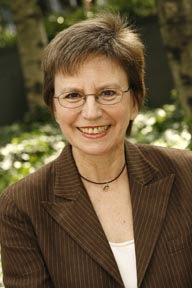Center for Global Ethics and Politics seeks transnational understanding of justice, democracy
 Photo by Ryan S. Brandenberg / Temple University
Gould
|
During the 1998 human rights trial of Chilean dictator Augusto Pinochet, international attention was riveted from the moment Pinochet was first arrested in London via a Spanish warrant for human rights violations. As the trial — which did not result in a conviction — dragged on, author Ariel Dorman wrote, “At a time when everything has been globalized, from capital to communications to production, what about justice, what about its globalization?”
As that and other infamous trials have illustrated, our world is no longer shaped solely by the borders nation states; today, political, financial, and legal institutions operate on a transnational basis, and people and ideas move freely across boundaries. In this age, says Temple philosophy professor Carol Gould, a global idea of justice, human rights and ethics is an imperative. |
|
To bring the issue of global ethics to the academic fore and to push for its inclusion in university curricula and research, Gould recently founded Temple’s Center for Global Ethics and Politics. “Global ethics is a growing field because there is a realization that we can’t just do ‘ethics’ without a more global, cross-cultural approach,” said Gould, the author of Globalizing Democracy and Human Rights. “In addition, there is a whole network of academic centers that deal with globalization, but not many that deal with global ethics. Temple’s center will be an important contribution to the field.” Members of the center, said Gould, will study not only theories of global justice and democracy, but also the practical governmental and institutional policies that affect global ethics. Gould noted that issues ranging from the humanitarian crisis in Darfur to the moral responsibilities of transnational corporations — areas where theory meets reality — will be analyzed at the center. In addition, she is committed to studying issues of gender and global justice, including sex trafficking, the human rights of women and domestic violence. Gould, who came to Temple last fall from George Mason University, directed the Center for Global Ethics at that institution. At Temple, however, Gould decided to incorporate a political component in the center. “I wanted to add politics in order not only to discuss theoretical frameworks, but also to consider actual policies. Here, the center can draw on the strengths of the international law program and the political science department at Temple,” she said. “We are interested in the expansion of democracy but not doing it in a hegemonic manner, and making sure that multilateral organizations are representative of all nations and not just the most wealthy.” Gould added that equality must be extended not just in theory, but also practically through institutions of global governance, like the United Nations. As the center begins its first semester as an official entity at the university, Gould has set up a Board of Faculty Advisors composed of scholars from various disciplines. They include philosophy professors Shelley Wilcox and Noel Carroll, political science professors Joseph Schwartz and Mark Pollack, law professor Peter Spiro, history professor Richard Immerman, communications professor Cornelius Pratt, and geography and urban studies professor Ben Kohl. Gould hopes to expand the list of faculty advisors and also plans to add a group of advisors comprised of members of the Philadelphia community. “Applied ethics can be addressed in any field,” said Gould, adding that the center’s main goal will be to address theories of international ethics through an interdisciplinary approach. “We are seeking to develop the theory and practice of human rights and democracy across borders in a transnational context.” To learn more about the Center for Global Ethics and Politics, go to www.temple.edu/cgep.
|
|